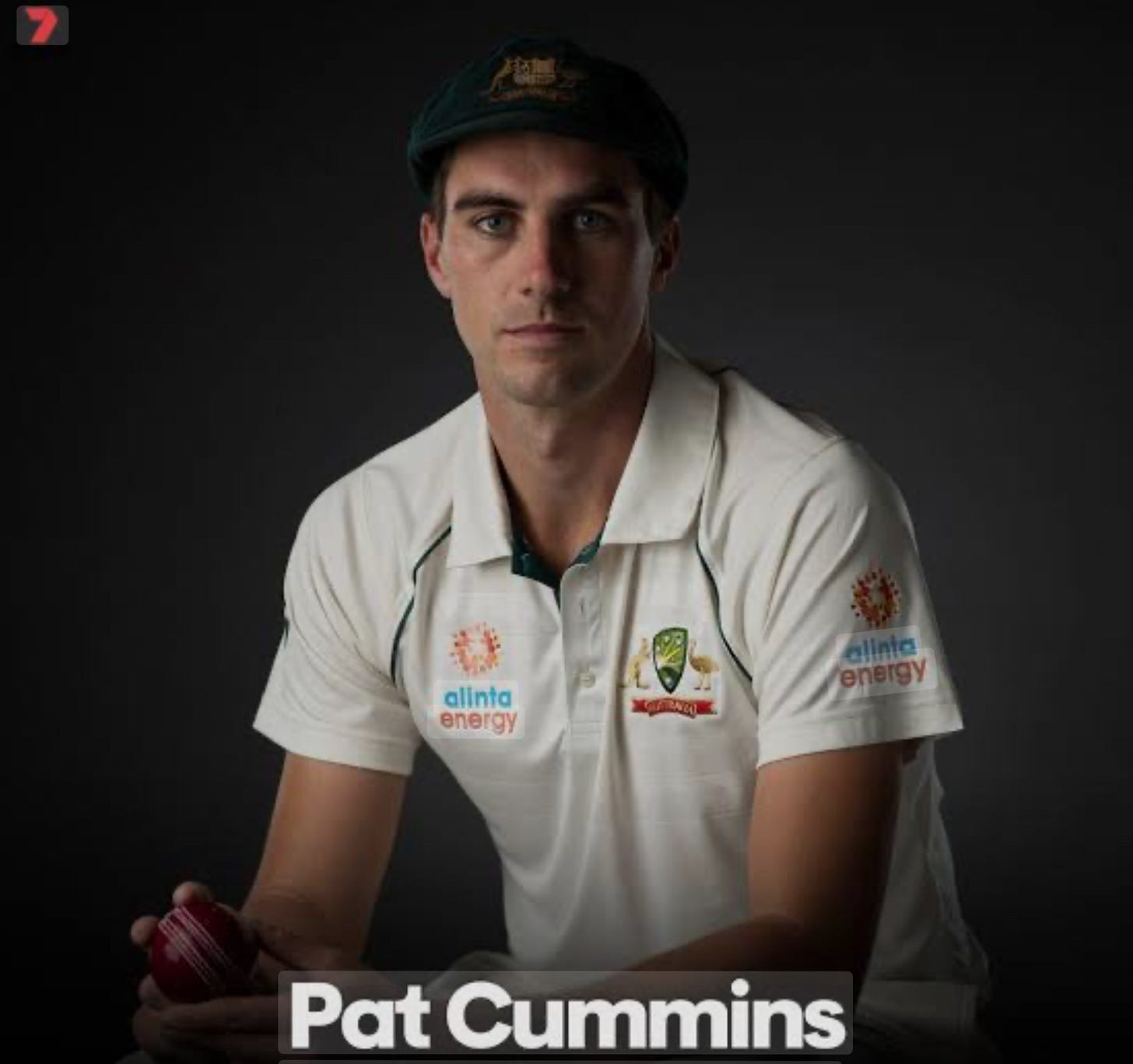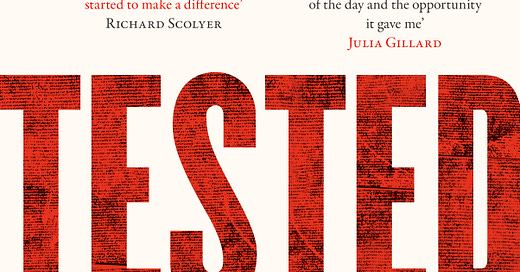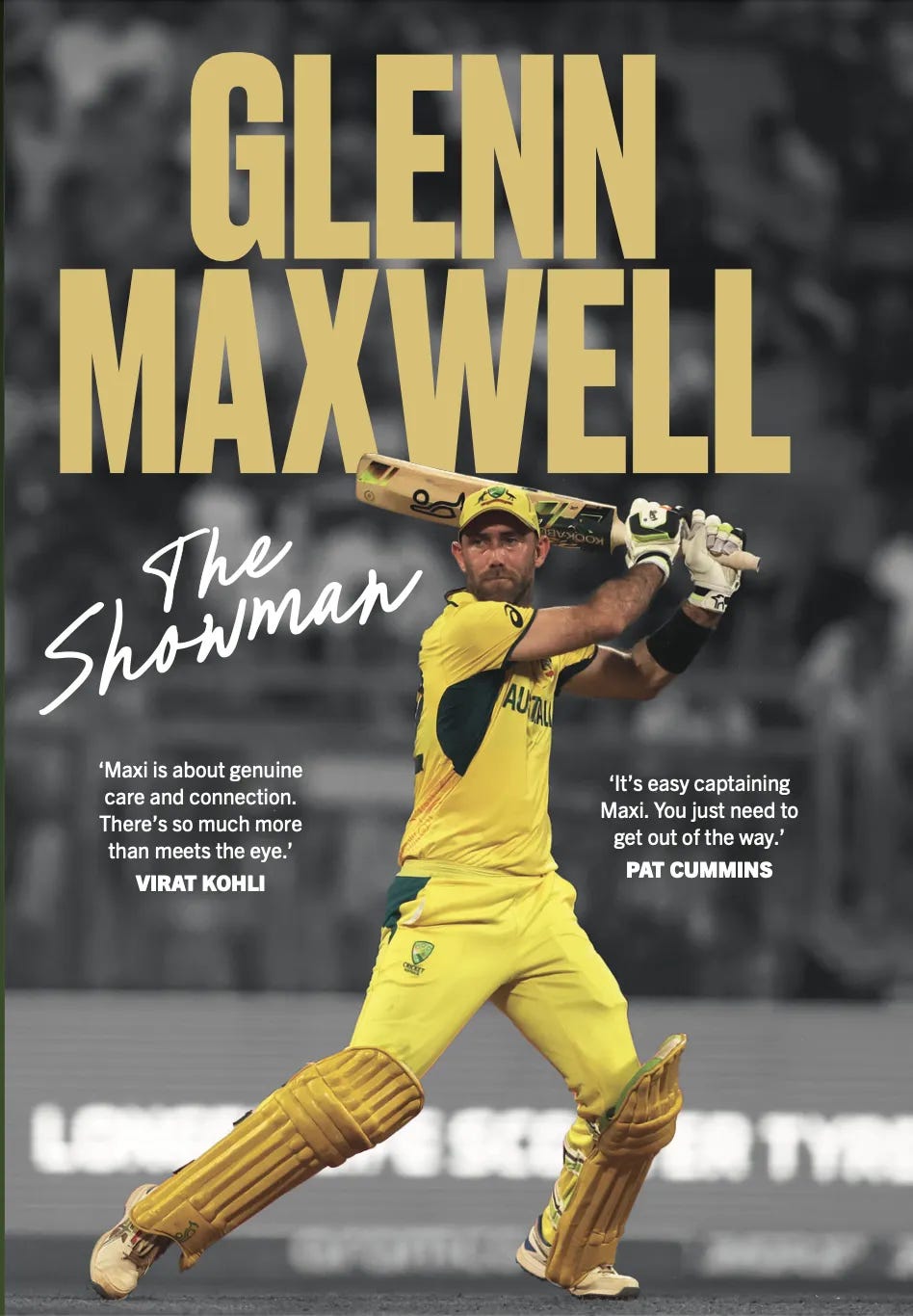Pat Cummins’ first literary flex follows hot on the heels of Glenn Maxwell’s celebrated new tome, and it is no surprise to find both similarities and departures in the exercises.
Glenn and Pat make an unlikely duo and share a hitherto unknown affection. One is as erratic as the other grounded; one up mountain and down valley, while the other maintains an almost zen like middle path; one all fireworks and sparks and the other a steady lantern light.
When Maxwell makes 200 against Afghanistan it is almost hard to notice the anchor at the other end who watches with mild amusement as the other slogs stiff legged sixes interrupted only by paroxysms of crippling body cramps. Cummins contributed 12 runs and the occasional amusing observation to their partnership of 202 at the World Cup.
He also contributed these observations in his foreward to Maxwell’s book The Showman:
“Our personalities were well balanced for that partnership. As he will tell you, we laughed a lot and tried to live in each moment. There were so many of them: reviews, drops, half chances, beaten edges, nicks, boundaries, maidens, Maxi lying flat on the turf.
“He leaves nothing in reserve, and didn’t that night. On the line between crazy and genius, I know which side he falls on. At the end of one over, a long way from the target, he said, ‘You just block out maidens, I’ll get all the runs.’ From anyone else, that sounds mad. But out of his mouth, it sounded plausible. It gave me the confidence that I could do my bit.
“When history assesses his 201 not out, I firmly believe it deserves even more credit. It’s undoubtedly the best one-day innings I’ve ever seen, and has to be the best ever played. It was the night his greatness had the space it needed to flourish to its fullest, and it was there for the world to see and respect.”
If you missed it, Gideon’s piece on The Showman is here and our interview with Glenn here
Cummins further observes that, “it is easy to captain Maxi: you just get out of the way. Give space to his potential, put him in a position to shine.”
Maxwell responds in The Showman with nothing but praise for Cummins and told Cricket Et Al in our recent podcast that he believes he is the best Australian captain he has played under, citing his leadership in the World Cup where the above innings was played.
Cummins new book Tested however, is not a cricket book.
In Tested the erudite quick has sought out stories from 10 people whose “resolve” he admires and introduces the book by explaining that the Australian captaincy came to him early, and his readiness to accept the role as a leader in the side came as something of a surprise to him.
While there is cricket in it, this book is as much a departure from the traditional cricket book as the appointment of the bespectacled and university educated fast bowler was a departure from the traditional type of Australian cricket captain.
“What would separate eighteen-year-old me, ready to play my first Test match, from the now 28-year-old me, ready to lead a Test team?” he asks himself while explaining the motivation for choosing the subjects for exploration in the book.
“I think what I developed in those ten years was resolve.
“Resolve is the desire to keep going, the wisdom to know where to focus your energies, and the fortitude to fight against the obstacles that you find along the way … It is hard to describe but easy to recognise, and when I see it in people from any field and in my personal life, I’m always interested in where they acquired theirs.”
A surprising cast of interview subjects follow. Former PM Julia Gillard numbers among them, John Bertrand, Dennis Lillee and his endurance running mate Nedd Brockmann also feature as does his long-time mentor, Rob Sitch.

My old history professor Geoff Blainey gave a lecture to first year arts students in 1981 in which he gave hints on how to get what you need from a book. He told us that books, like fish, exist to be gutted. You could quibble - especially if you have tropical fish - but his guidance on how to get the best out of an academic text was invaluable: read the start and the conclusion of every chapter because academics set out their thesis and recap their conclusions there, but the real gold was when these books had a final chapter which included a summary of everything that came before it.
Cricket journalists gut books like Tested in order to find “the stories” and given as we’re among cricket fans here at Cricket Et Al I’ll present to you a few of the insights that slipped through.
The offer to captain Australia came when Cummins’ wife Beck had given birth to their first child and at a time when the game was being played by people who lived like caged circus animals because of the pandemic.
“I didn’t feel prepared. I’d recently captained New South Wales in a handful of one-day matches, but before that I hadn’t captained a side since I was fifteen. I hadn’t even really thought that much about being the captain, even though I’d been a vice-captain for sometime. I was a bowler, after all; there hadn’t been a bowler who’d captained the Test team for generations.”
He reveals that both Steve Smith and he presented their case to the board.
Cummins warmed to the task as he prepared for the pitch, which included a few motherhood quotes along the lines of: “being a cricketer is part of life, it doesn’t define me … and all problems can be solved”.
You may remember that this occurs not long after the board had been alerted to tensions between players and then coach Justin Langer. Given that, his words would have been music to the ears of a concerned committee.
Cummins, who’d rarely been called on to lead during his career, learned to captain on the job and at great speed and from eclectic sources.
In his chapter with Bertrand, Cummins draws parallels between that campaign with the risk and reward equation that saw the sailor bring home the World Cup - and admits he didn’t actually rate their chances going into the event.
“I felt we had a great side that was playing well – yet if I was being perfectly honest, I thought we weren’t good enough to win a tournament in India competing solely on skill. I thought if we performed well, we’d probably be able to finish third or fourth, an outcome that wouldn’t be condemned but neither would it be really celebrated. With a result like that, no one would lose their jobs and no fans would walk away from us, but none of us in the teams would remember it especially fondly.
“In that moment we had to decide what our ambitions were. If our hope was to perform well and not disappoint anyone, we could have gone on as we had before, but if our ambition is to win the tournament, I thought we had to bring some risk and variance into our decision making … that might see us fail, losing in the round-robin stage or in the early knock-out phase, which would leave us ripe for harsh scrutiny.”
Drilling down, Cummins muses about finding a way to get your players into a “flow state” and concludes it was his role to get out of the players way, allow them to solve their own problems by asking them the right questions and having faith in their abilities. The side took a risk when Travis Head was injured at the start of the tournament and had their faith restored when he delivered on recall.
Maxwell’s two most significant “flow state” innings occurred with Cummins at the other end. The most memorable when the skipper walked out to bat against Afghanistan with his side 7-91 and some 200 runs in arrears. Maxwell acknowledges this in The Showman.
“Patty kept playing his roles to perfection. One was to keep me talking and relaxed, showing how well he understands his players. When a wide went down the leg side he deadpanned to me, ‘We’ll get them in extras’. We didn’t think we were a genuine chance of winning, so the pressure was off. But it must have been annoying for Afghanistan in their dominant position to see us smiling and chatting like two blokes at the pub.”
Cummins says the World Cup squad “reframed what success and failure would look like to us … we decided that ‘failing’ would no longer be about losing games. We would only be disappointed in our performances if we didn’t stick to our tactics, if we let the pressure and stress and exhaustion push us back into playing safe.”
Cummins was bestowed the captaincy during the crisis that surrounded the Test side when Tim Paine stepped down ahead of the Ashes 2021-22. He walked into another controversy inside his first 12 months when Langer was managed out and the coach’s mates - Hayden, Ponting, et al - turned on the captain and his team.
The bowler has always shown an ability to keep his own counsel and was notably silent during much of this brouhaha, saying he was “never going to get caught up in the public fight”.
“Things snowballed in the media, but what I find funny is that the big things in the media end up being either incorrect you become desensitised to the hyperbole. I got through it by remembering that my job is to look after Australian cricket, not the ex-players. I learned from this time that regardless of what decision you make, you’re going to upset some people.”
Pushed to break his silence ahead of the first Test, Cummins put the matter to bed with one simple observation: they can look after their mates and I’ll look after mine.
There is, however, still an undercurrent of complaint that exists among the current teams who bristle at the judgment of those who have gone before them. No better example of that is Adam Zampa’s role as “keeper of the receipts”.
“It’s important to truly step away,” Cummins writes in his chapter with the former PM Gillard. “And then, when you do step away, as Julia said, it’s important to truly step away. You can be a resource for the next lot of leaders, but you’ve had your go and you have to let them make the decisions.
“I hope once my time is done, I will be able to step back and let the next generation take over just like Julia has done.”
Whether this generation is thin skinned, or the previous one too harsh in its opinions is a debate you could take either side of. The situation is, however, disappointing to observe and looks a little petty from a distance.
Cummins confirms journalists suspicions that he pulls his punches more often than not, admitting to a wariness developed around his public statements at events and in press confereces.
“I wear an armour of sorts when I go into these speaking engagements and have learned to be guarded. Usually I stop a little short of what I might like to say”.
When Gideon and I worked for The Australian we’d be amused by the insanity of the comments section at any mention of Cummins. The culture war clowns were inflamed by his respect for climate science and bristled at any mention of his university education. Just mentioning him was like throwing red meat to the wolf pack.
“I’m on the record for being passionate about supporting climate change and the Indigenous Voice to Parliament,” he writes. “With the leadership role and social media platform I have, I want to be a positive part of the conversation, supporting creative solutions. For some, that might make me ‘Captain Woke’ but for me it’s just about wanting a better future for my kids and future generations …
“I often wish there was more of an allowance for respectful failure in public discourse. There’s a lot to be said for being more respectfully direct, more colloquial, maybe even more vulnerable in press conferences and speeches. But it’s risky if you get it wrong, unintentionally causing offence, judged as too flippant. It takes a lot of bravery to fail.”
Yep.







Cummins strikes me as being one of the most well rounded deep thinkers Australia has had as a captain. He can manage people better than most, and in this regard reminds me of Mike Brearley, although the former England captain could never lead through personal ability and performance like Cummins. Richie Benaud and maybe Steve Waugh also come to mind as independent thinkers beyond cricket.
I too recall the ridiculous comments in the Oz whenever Cummins name was mentioned. A more ignorant lot you couldn’t find anywhere.
Thanks for reading it. You've convinced me. I'll have to get it now.
Just by the by, how many poor bowler-captains have there been? There have been several absolute crackers, especially if you include bowling all-rounders. According to legend one of the first, George Giffen, never took himself off, so perhaps that's a problem, but he was a long time ago. Maybe the prejudice in favour of upper-order batsmen is an unconscious inheritance from the dark days of English amateurism, and the time is ripe for more of the blokes who know how to get batsmen out?